What if a simple cup of tea could unlock a deeper state of mindfulness? It can even improve your meditation practice. Tea and meditation share a long history, where tea was used to relax and focus. By learning about tea’s benefits for meditation, you can find a new way to be mindful and better your well-being.
The bond between tea and meditation goes beyond taste. Tea offers many benefits for meditation, like reducing stress and promoting calm. As people look for ways to add mindfulness to their day, tea meditation is gaining popularity. It combines mindfulness with the traditional tea ceremony, creating a powerful meditation practice. This practice deepens your understanding of the connection between tea and meditation.
The Connection Between Tea and Mindfulness
Tea is a powerful tool for mindfulness, helping people slow down and enjoy the moment. It’s perfect for tea as a meditation tool. The act of making tea, from boiling water to steeping leaves, is meditative. It encourages mindful tea drinking and helps people focus.
Experts say we often do things without being fully present. This shows how important it is to be in the moment. Tea rituals for meditation help us appreciate life’s simple joys. The process of making tea engages our senses, leading to a calm, aware state.
Tea and mindfulness together bring calm and clarity. Whether it’s oolong tea’s delicate taste or chamomile’s soothing effects, tea enhances meditation. It helps us find balance and harmony.
Benefits of Tea for Meditation
Tea has been a long-standing companion to meditation, bringing unique benefits. It helps individuals feel calmer and clearer, making it easier to focus. Enhancing meditation with tea is natural, thanks to tea’s phytochemicals like L-theanine. These compounds reduce stress and improve concentration.
Tea is great for mindfulness practice because it promotes relaxation. Sessions can last from 10 minutes to an hour or more. This makes it easy to add mindfulness to your day. By making tea a part of meditation, you can grow your awareness and find inner peace.
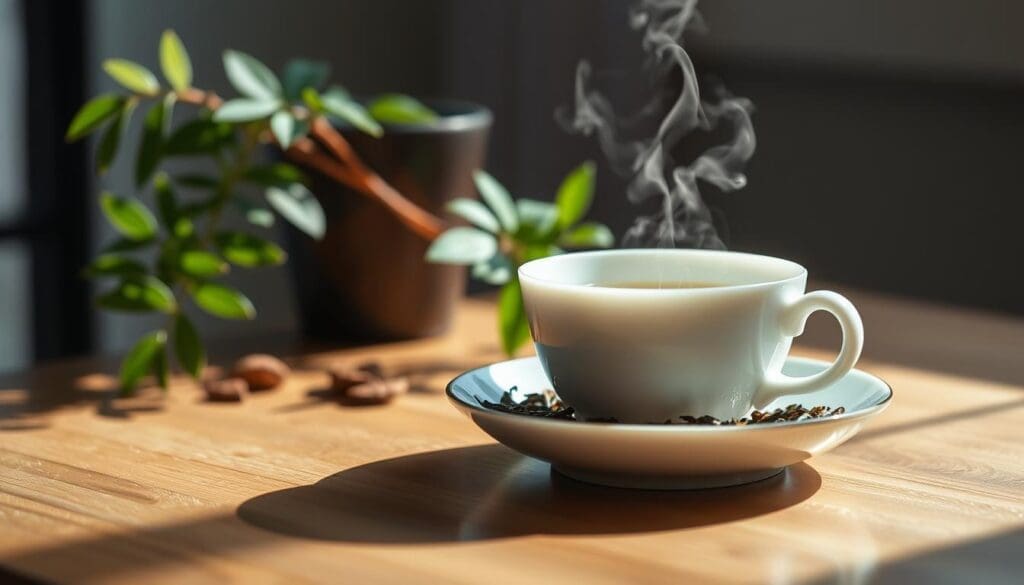
Regular meditation with tea can deeply impact your emotional and physical health. It lowers stress hormones and boosts the brain’s prefrontal cortex. This leads to better emotional control and a stronger immune system. As the U.S. tea industry grows, so does its role in stress relief and meditation.
Choosing the Right Tea for Meditation
Choosing the right tea for meditation is key. The right tea can make your meditation better by improving focus and calm. It’s important to pick a tea that fits your meditation style.
Green tea is great for meditation because it has L-theanine. This helps you relax and focus. Herbal teas like chamomile and lavender are also good for calming down. The goal is to find a tea that makes your meditation better.
Types of Tea to Consider
There are many teas to choose from, like green tea and herbal teas. Each tea has its own benefits. Knowing about different teas helps you pick the best one for your meditation.
Herbal vs. Traditional Teas
Herbal teas, like peppermint, are calming. Traditional teas, like green tea, boost energy and focus. Your choice depends on what you want from your meditation. Picking the right tea makes your meditation better.
The Perfect Brewing Techniques for Mindfulness
How we brew our tea greatly affects our meditation. Paying attention to water temperature, brewing time, and ingredients quality makes it mindful. Tea rituals help us focus and be present.
Using top-notch tea leaves and fresh water changes the tea’s taste and smell. It also makes us appreciate life’s small joys. As we drink tea mindfully, we notice its details, like the water boiling and leaves unfurling.
Water Temperature and Brewing Time
The water’s temperature and brewing time affect the tea’s flavor and smell. By focusing on these, we slow down and enjoy the moment. Mindful tea drinking helps us be more aware and present.
The Importance of Quality Ingredients
Quality ingredients are key for a mindful tea experience. Good tea leaves and water connect us to nature and make us appreciate life. Tea rituals for meditation help us see the beauty of now and feel grateful.
Creating a Comfortable Meditation Space
To fully immerse oneself in the practice of tea and mindfulness, it’s essential to create a comfortable and peaceful meditation space. This space should be free from distractions, allowing individuals to focus on their breath and the present moment. By incorporating tea into this space, one can enhance the experience, promoting relaxation and calm. The presence of tea can be as simple as a tea table and chair or as elaborate as a dedicated tea room with soothing music and calming scents.
As we consider the role of tea in meditation, it’s clear that tea benefits for meditation are numerous. Theanine found in tea helps promote relaxation, while caffeine aids in focus, creating a balance beneficial for meditation. This balance is key in creating a comfortable meditation space, where individuals can fully engage with their practice. By setting up a quiet and cozy space, one can create an atmosphere that fosters mindfulness and calm, allowing for a deeper connection with the self and the present moment.
In creating this space, it’s essential to consider the importance of tea and mindfulness in promoting relaxation and reducing stress. By incorporating elements such as candles, incense, and soothing music, one can create a peaceful atmosphere that complements the practice of tea meditation. This, in turn, can lead to a more profound and meaningful experience, allowing individuals to cultivate a greater sense of awareness and calm in their daily lives.
Ultimately, the key to creating a comfortable meditation space is to prioritize comfort, peace, and tranquility. By doing so, individuals can create an environment that supports their practice of tea and mindfulness, allowing them to fully immerse themselves in the present moment and cultivate a deeper sense of awareness and calm.
How to Integrate Tea into Your Meditation Practice
Enhancing meditation with tea is all about being mindful and intentional. Using tea as a pause to reflect on our thoughts and feelings helps us become more aware. The smell of certain teas can remind us to slow down and enjoy life’s simple moments.
Timing is key when using tea in meditation. Synchronizing our tea ritual with meditation makes it easier to stick to a routine. Just a few minutes each day to brew tea and focus on the present can make a big difference.
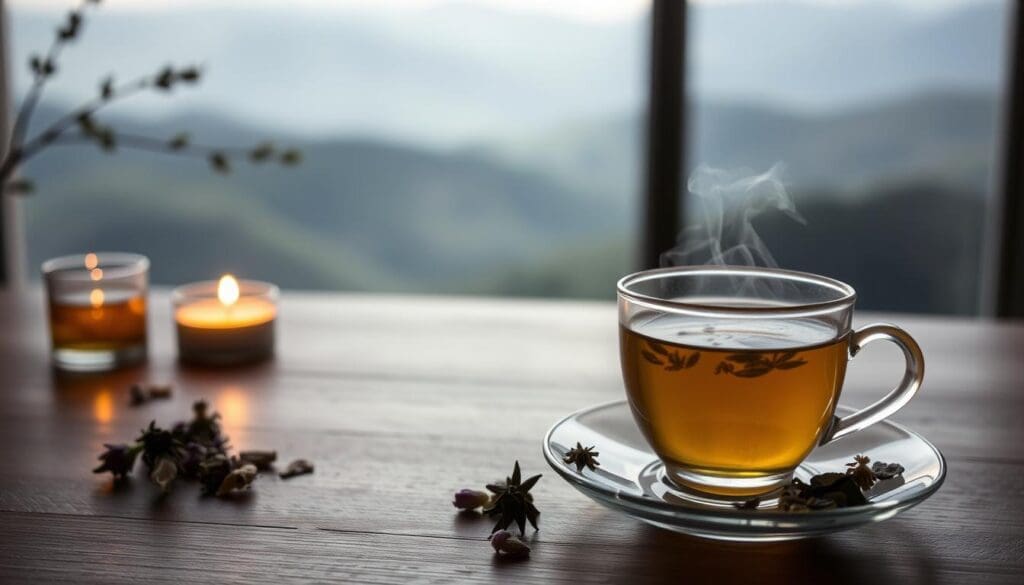
Tea can bring a deeper calm and relaxation to our meditation. Preparing tea is a meditative act in itself. From picking the vessel to enjoying the last sip, it guides us to be fully present. As we sip, we can appreciate the flavors, aromas, and textures, deepening our gratitude and making meditation more fulfilling.
Tea and meditation together create harmony and balance in our lives. They help us connect with ourselves and the world. Whether it’s green tea, oolong, or another variety, the goal is to be fully present and enjoy the experience.
The Science Behind Tea and Mental Clarity
Tea and meditation work together to boost mindfulness and clear the mind. Tea’s phytochemicals, like L-theanine, deeply affect brain function and mood. This knowledge helps us see how tea and meditation can improve our mental state.
L-theanine in tea helps us relax and focus better. It’s key in today’s busy world, where many feel stressed. Drinking tea regularly can help us feel less stressed and more mentally balanced.
Tea’s mix of caffeine and L-theanine helps us stay alert without feeling anxious. The act of drinking tea also adds to our meditation, making us feel calm yet alert. Adding tea to our daily routine can make us feel better mentally and reduce anxiety and depression.
The science behind tea and mental clarity is interesting. The benefits of tea in boosting mindfulness are clear. By picking the right tea and drinking it mindfully, we can relax, reduce stress, and feel better mentally. Whether it’s green, black, or herbal tea, the benefits of tea and meditation are undeniable, helping us live a healthier, happier life.
Mindful Drinking: The Art of Savoring Tea
Drinking tea is more than just a habit; it’s a way to be present and aware. Mindful tea drinking is an art that needs attention and intention. It lets us enjoy the moment and find peace in quiet times.
Tea ceremonies teach us to drink tea slowly and mindfully. This is the heart of tea rituals for meditation. By doing this, we turn our tea time into a meditation, connecting with ourselves and the world.
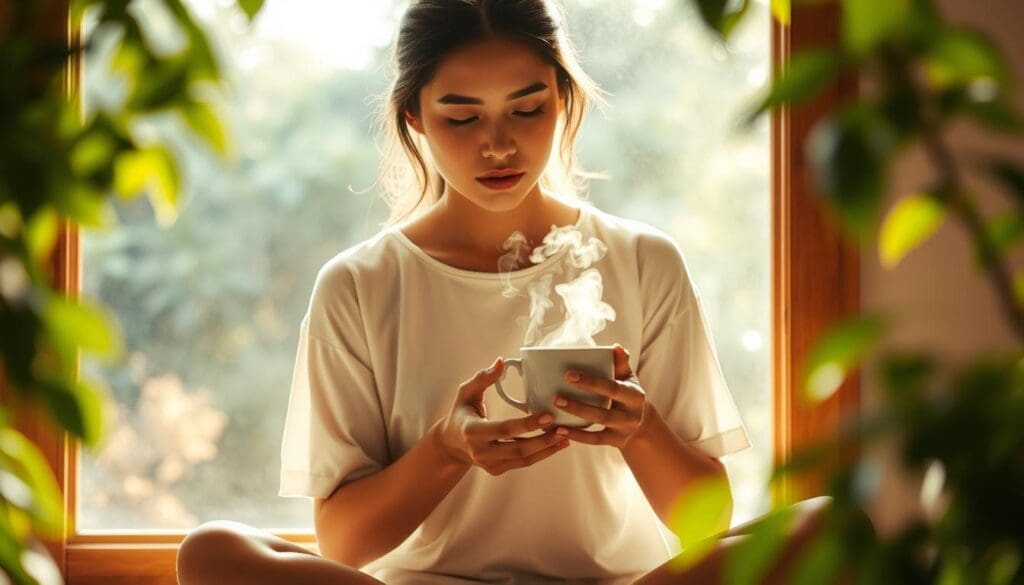
When we slow down to enjoy our tea, we notice its flavors, aromas, and textures. This mindful way of drinking tea can make us happier and less stressed. It helps us find peace and joy in a simple cup of tea.
Starting tea rituals for meditation helps us see the beauty of now. The world becomes more vibrant with new experiences. Mindful tea drinking can change our lives, one cup at a time, bringing us happiness and fulfillment.
Conclusion: The Harmony of Tea and Mindfulness
Reflecting on tea and mindfulness, we see a powerful union. This union greatly improves our meditation. Tea’s ancient traditions blend well with mindfulness, leading to self-awareness and peace.
Using tea in our daily mindfulness practice helps us stay consistent. Drinking tea slowly lets us enjoy its taste and smell. It helps us focus on the moment and appreciate life’s small joys.
Exploring tea and meditation together reveals many benefits. It boosts focus, reduces stress, and improves emotional health. This combination brings us closer to inner peace and harmony.
In the end, tea and mindfulness together are a key to personal growth. By incorporating them into our lives, we enhance our meditation. We also deepen our connection with ourselves and the world.

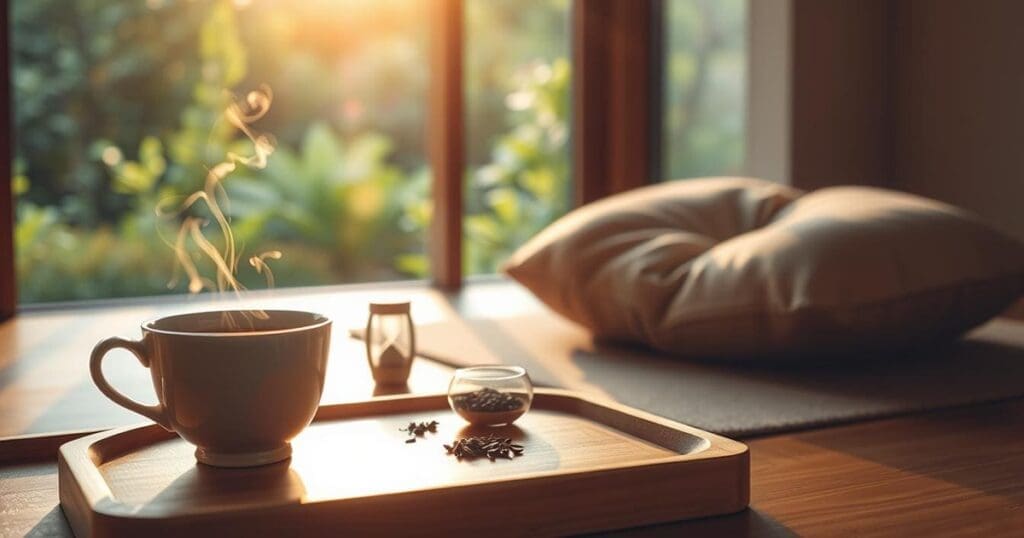

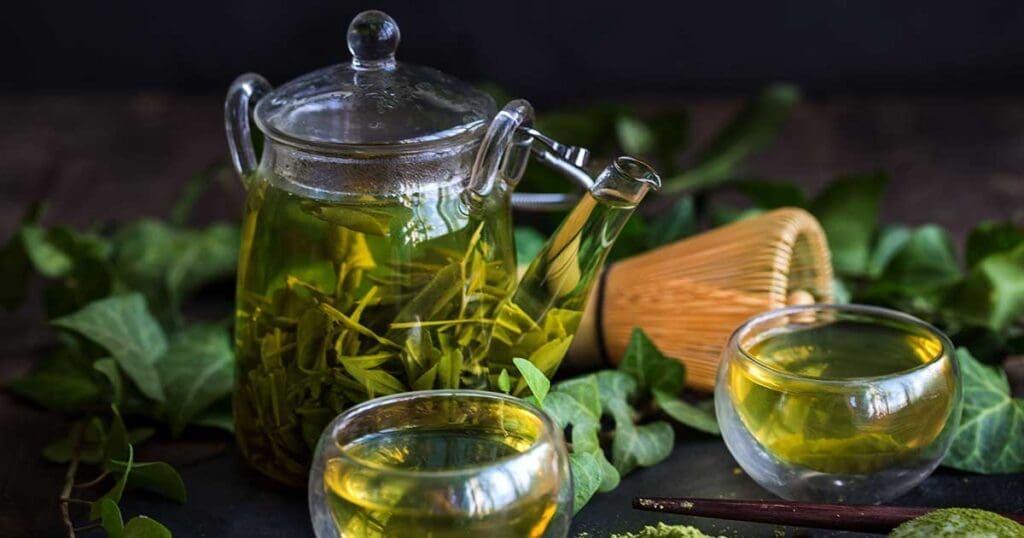
Facebook Comments